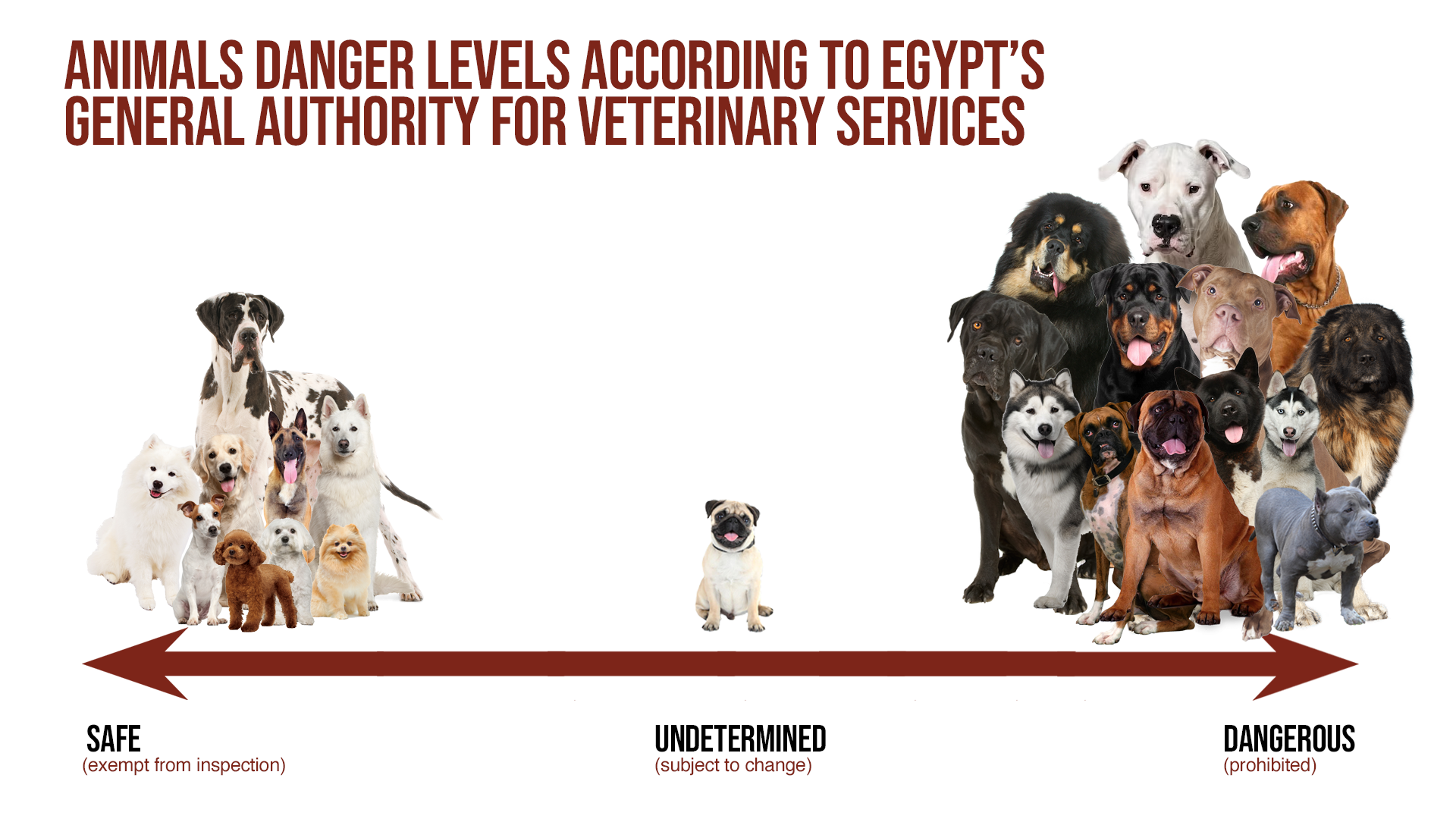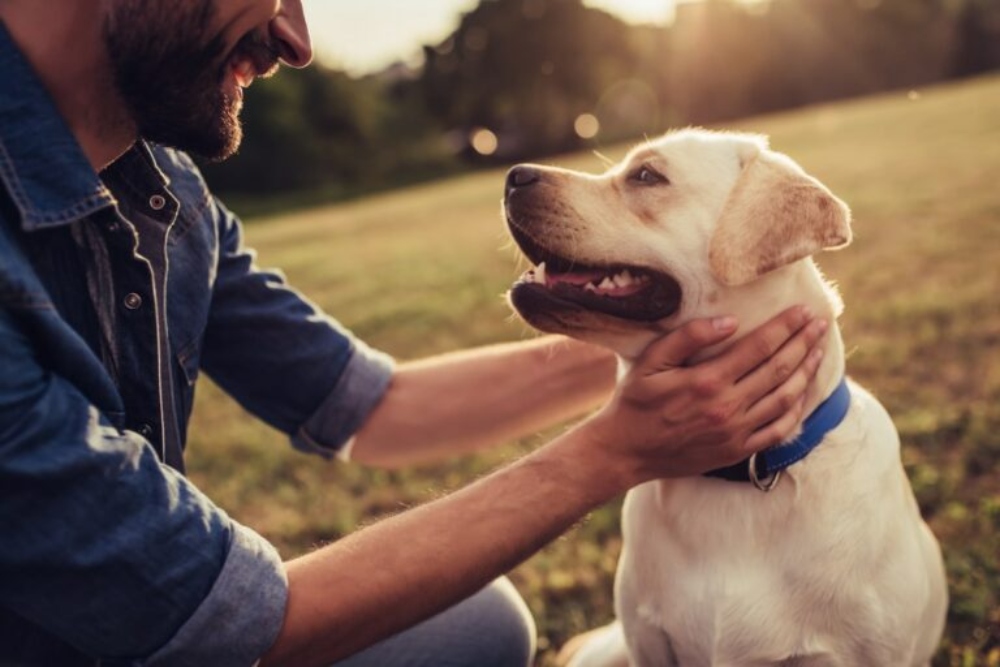“A man’s best friend” is how dogs are popularly known. Their loyalty, friendliness, and bubbly spirits make them amiable members of millions of Egyptian families.
Although there are no exact figures on the dog population in Egypt, dog ownership has become more common in the last few years. Today, it is estimated that Egyptians own more than three million dogs.
In May, Egypt’s House of Representatives approved a bill formally known as ‘Regulation of Ownership of Dangerous Animals and Dogs Law’. The law classifies dangerous animals as “that which causes harm or damage to humans or animals,” as written in Chapter 1, Article 1 of the legislation. The bill was ratified by Egyptian President Abdelfattah Al-Sisi after receiving preliminary approval in parliament.
According to the General Authority of Veterinary Services (GAVS), the authoritative body on the new law, certain dog breeds were deemed dangerous. These were Pitbulls, Rottweilers, German Shepherds, Huskies, Caucasian Shepherds, Bullmastiffs, Dobermans, Alaskan Malamutes, Great Danes, Akitas, American Bullies, Alpine Mastiffs, Dogo Argentinos, Cane Corsos, and Tosa Inus.
On the other hand, only 10 breeds were exempt from the list: the Cocker Spaniel, Labradors, Poodles, Malinois, Pomeranians, Jack Russell terriers, Great Danes, White German Shepherds, Maltese, and Samoyeds.
The new law prohibits the ownership of dangerous animals and regulates the possession of non-dangerous dogs through licensing and documentation. While there is no mention of mixed-breeds or baladi dogs, the law states that the list is subject to expansion.
Despite not being implemented yet, the announcement of the law sparked outrage among the Egyptian public.

Public Opinion: With or Against?
“Associating dogs with dangerous animals is unacceptable because it’s only going to increase public hatred towards street dogs — actually all dogs in general,” Hanan Deebes, cofounder of the Animal Protection Foundation (APF), tells Egyptian Streets.
Founded in 2013, APF is a non-profit dog shelter in Egypt, home to more than 2,000 rescue dogs. Like many shelters across the country, APF strives to improve the lives of dogs in Egypt, mainly by rescuing street dogs in dire need.
Commenting on the recent pitbull attack that took place in Sheikh Zayed City and which resulted in the death of Mohamed Moheb, a 42-year-old bank manager, Deebes argued that it is unfair to punish all pitbulls for an attack by one pitbull.
“Does it make sense to punish all human beings for one human being’s mistake? Or should we take the person who made a mistake and hold him accountable? In any country that has laws protecting animals, there is nothing known as ‘the pitbull is dangerous’. There is a dangerous pitbull, and a harmless pitbull,” Deebes continues.
Similarly, Abdulrahman Helmy, a Cairo-based engineer who owns a Doberman and a Cane Corso, echoes Deebes’ opinion on the state’s reaction to the accident.
“I have no problem with regulating the ownership of dogs, by putting leashes or masks on the dogs if they’re dangerous, and vaccinating them, but taking all the dogs from their owners is nonsense,” Helmy says.
Due to an increase in the number of stray dogs in Egyptian streets, many choose to adopt instead of buy. Nevertheless, there are plenty of cases where individuals import dogs from abroad because of a desire to pet a specific dog breed.
Helmy argues that laws cannot be implemented retroactively.
“If it was previously legal to have these dogs as pets, then no one can approach me now and take away my dogs — that would be illegal,” Helmy says.
With a firm belief that dog ownership is a responsibility, Helmy has been living with and taking care of dogs since his childhood. He was shocked to realize that his dogs are in the list of banned dog breeds for allegedly ‘being dangerous’.
“You should see how these dogs are with children. And that is because they are well-trained,” Helmy explains.
View this post on Instagram
Dog Training and Grooming in Egypt
From boarding centers to kennels, there are numerous places for dog owners to train their dogs across the country. Rehabilitation services, obedience training, and daycare have become extremely popular in Egypt with the rise in the number of dog owners.
Based in Alexandria, Nada Eltoukhey, pet groomer and founder of Critters, a pet grooming salon, questions the rationale behind the list of dangerous dog breeds, compiled by the GAVS.
“Some of the dogs in the dangerous dogs’ list are tame. Who put these lists and based on which standards? Are they based on international standards or just haphazardly?” Eltoukhey tells Egyptian Streets.
“As a specialist in dog breeds and a dog groomer, I can confidently say these lists have been created randomly.”
A dog owner herself, Eltoukhey repeatedly wonders how the law was formulated throughout her conversation with Egyptian Streets.
The new legislation states that the selection was based on a report presented by the GAVS’s Scientific Committee. Nevertheless, it does not specify the rationale behind the selection.
“There are plenty of training schools for dogs all over the country. So one cannot simply generalize and ask all dog owners to put masks on their dogs, even the small and harmless breeds,” Eltoukhey adds.
Regulating Dog Ownership or Restraining Dog Owners?
In the past few years, Egypt began introducing certain rules and regulations to dog ownership. In 2020, the GAVS announced that owners of pet dogs are required to obtain a license which would later be attached to their pet’s collar. Under these regulations, dog owners were required to provide documents proving that their pet has been examined by a certified veterinary unit and has been vaccinated against rabies.
These regulations came into effect at a time when there were tensions between municipal authorities and Egypt’s animal rights community, as the GAVS was repeatedly accused of wrongfully killing stray dogs.
One of Deebes’ main concerns, one shared by many pet owners, is their lack of knowledge on where their dogs will end up staying, what will happen to them, will they be fed and taken care of, and what their fate will be.
“We don’t even know where our dogs will end up. How can I give my dog away to the General Authority for Veterinary Services, which poisons street dogs?” Deebes adds.
View this post on Instagram
Under the new law, dog owners are required to license their pets at the GAVS within six months of passing the law. The license costs between EGP 1,000 (USD 32) and EGP 15,000 (USD 485). Failing to do so will result in strict penalties ranging from one to more than 20 years in prison and fines between EGP 100,000 (USD 3,235) and EGP 4 million (USD 129,383).
Certain dog breeds are not dangerous, but certain dog owners are. This is what most dog owners have been saying since the announcement of the problematic law in Egypt.
Whether their disagreement on the law is due to the fees being too high or the irrationality of deeming certain breeds dangerous, dog owners in Egypt continue to voice their opinions through social media campaigns and lawsuits to Egypt’s State Council, in hopes of getting their voices heard.
Subscribe to the Egyptian Streets’ weekly newsletter! Catch up on the latest news, arts & culture headlines, exclusive features and more stories that matter, delivered straight to your inbox by clicking here.







Comment (1)
[…] Dangerous Animals or Furry Friends: Egyptians Speak Up Against Recent Draft Law […]